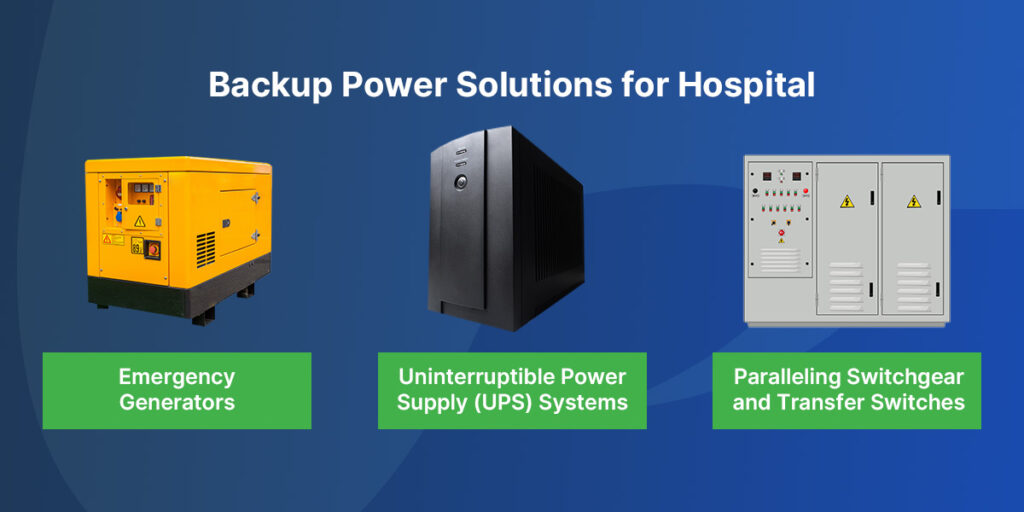Hospitals rely on consistent, clean power to carry out almost all essential operations and patient care functions. From robotic operating equipment to temperature-controlled medication storage, an extensive range of devices demand reliable power, making continuous uptime absolutely vital in healthcare settings.
However, because power outages are a fact of life, all healthcare facilities must be prepared, with a response plan that includes information on how your emergency power supply can support the most critical functions.
The Consequences of Power Outages in Hospitals
While downtime costs can be exorbitant throughout all sectors of the economy, the toll is especially great in hospitals. Among the many potential ramifications of even a brief power failure within a hospital, the impacts on patient care are the most serious.
- Critical care: Without a sufficient and reliable backup power source in place, an extensive range of critical medical equipment could fail if a facility loses power, leaving patients in jeopardy.
- Surgery: In operating rooms, surgical lighting and heart rate monitors could shut off with patients on the tables.
- Medication: Without sufficient emergency power systems, medication dispensaries could fail to open, and medications that require specific temperature thresholds in freezers or refrigerators could be jeopardized.
- Sterilization: Medical and lab settings that rely on autoclaves could lose access to this key source for sterilizing equipment and medical tools.
- Laboratories: The hospital lab is another area that is particularly vulnerable during a power cut, as reagents in freezers and refrigerators have specific temperature thresholds, as do refrigerated blood products in blood banking areas.
- Diagnostics: A power outage that disrupts magnetic resonance imaging (MRI) or computerized tomography (CT) scans could require tests to be repeated, hindering the speed of diagnostics and putting patients at risk for additional exposure to radiation. CT scanners and MRIs are particularly susceptible to power loss and it can take one to two hours to bring systems back online when they go down.
- Administration: A power outage can prevent access to patient records, billing and payments, compromising a hospital’s most essential administrative needs.
- Data security: The hospital data center is responsible for critical functions such as maintaining patient data and keeping communications systems up and running. Power outages could put hospital data at risk of corruption or loss, potentially affecting patient records and creating compliance issues with HIPAA requirements for maintaining data integrity.
The effects of a power outage in a hospital not only compromise patient safety but can take a huge toll on a hospital’s bottom line. Consider the fact that ultrasounds, MRIs, CTs, and X-rays not only provide crucial diagnostic and treatment capabilities, but generate significant revenue, as well. When these imaging systems go down during a power outage, it hinders emergency diagnostics and the ability to complete many routine checkups and procedures. Unexpected outages may also force hospitals to turn away new patients, transfer existing patients and reschedule elective surgeries.
In addition to patient services, systems such as heating, ventilation and air conditioning (HVAC), elevators and food preparation areas could also be impacted. Air conditioning, in particular, consumes an immense amount of energy, but some facilities do not have backups for this system. Adding HVAC could almost double the load for emergency generators, but extreme temperatures can pose a direct threat to patient safety.
Backup Power Solutions for Hospitals
Hospitals have enormous power demands, and continuous access is instrumental in ensuring patient safety and maintaining a high standard of care. When it comes to protecting hospital environments against downtime threats, the optimal life-support system is a multi-pronged emergency power approach. The system should work together to provide instantaneous power during an outage ― and then supply the hospital’s electrical needs until utility power is restored.
This emergency power system should include three elements:

1. Emergency Generators
An emergency generator provides power to key systems within a hospital when there is an outage. These systems usually turn on as soon as an outage is registered. The types of generators hospitals can use include:
- Mobile generators: These generators can be moved to different areas, making them a great option if the primary backup generator is having problems.
- Diesel fuel generators: These powerful generators are ideal for health care facilities with large power demands as they are able to support a large amount of equipment and offer economical fuel use.
- Gas generators: While gas generators may be less powerful than their diesel fuel counterparts, they can be more versatile in their fuel source.
Per code requirements, there are two levels of emergency generators — those that power life support systems and other vital hospital equipment, and those that power systems unrelated to patient care, like lighting.
2. Uninterruptible Power Supply (UPS) Systems
UPSs are one of the best backup power solutions for hospitals because they kick on automatically when the power goes out. They are a short-term solution to maintain uninterrupted power while the generators turn on. The UPS relies on an internal battery to back up medical equipment and is designed to provide up to 10-15 minutes of power.
A UPS can also protect your systems and equipment in the event of a surge. Most UPSs protect sensitive equipment during anomalies in the power supply delivery, such as voltage dips or minor surges, and can prevent sensitive data from being lost during momentary lapses of power.
3. Paralleling Switchgear and Transfer Switches
Paralleling switchgear and transfer switches are another element of a hospital’s backup power system. These components can facilitate the use of multiple generators, which is key for large facilities. They pass on remote start signals, close circuit breakers so generators can synchronize and allow loads to transfer to the bypass switch without interrupting the power supply.
Industry Codes and Standards for Emergency Power Systems
With lives at stake, it’s not surprising that hospital emergency power systems are regulated by industry codes and standards. The National Fire Protection Association (NFPA) Life Safety Code, NFPA 101, Health Care Facilities Code, NFPA 101, and Standard for Emergency and Standby Power Systems, NFPA 110, provide essential guidance for healthcare facilities:
- NFPA 99: This code determines the performance, testing and maintenance requirements of electrical systems within hospitals and other medical centers. It covers the specific equipment that hospitals must have connected to their emergency power supply.
- NFPA 101: NFPA 101 specifies that any medical-care facility with patients depending on life support must install and maintain emergency power compliance. In particular, the code dictates that emergency lighting should include a battery backup that will supply at least 90 minutes of power.
- NFPA 110: This code dictates requirements for emergency power supplies. It divides them into classes, types and levels. The class indicates the operation time, the type indicates the amount of time the system takes to restore power, and the level indicates whether the systems are powering equipment essential to life. In a hospital, Level 1 and Level 2 equipment will operate on different systems to ensure patient safety.
The National Electrical Code (NEC) also covers requirements for healthcare facilities in Article 517. This details everything from building requirements to ground fault protections and essential electrical systems (EES). The NEC also designates different requirements for different patient care areas, such as general care spaces and operating rooms.
Complying with all these regulations, however, is the bare minimum of protection. For a comprehensive solution to ensure your emergency power system supports uninterrupted operations, you need to consider the unique needs of your facility and patients.
How to Improve the Resiliency of Your Standby Power
There are many challenges to establishing an emergency power supply for healthcare facilities, but the core issue lies in the enormous reliance hospitals have on electrical power. For example, whereas pharmacies previously handled all patient medications, nurses typically now work with automated dispensing cabinets, so a power outage could impact the timely distribution of medication to patients.
Steps you can take to overcome the challenges of a power outage in a hospital include:
- Understand your power needs: To accurately gauge the amount of emergency power you need, assess how much electricity your EES consumes. Then, you can determine the proper amount of standby power required by your emergency systems.
- Perform a vulnerability assessment: Identify areas not covered by the backup system and record your equipment’s fuel consumption rates. You should also consider the reliability of your power grid and potential disruptions due to your area’s climate.
- Coordinate with utility providers: Establish a maintenance plan to limit disruption to patients and hospital operations.
- Regularly service generators: Routine maintenance for generators is essential to keep your emergency power supply safe. Conduct routine checks and tests on the equipment as dictated by the relevant codes and regulations. Maintenance should also include properly storing fuel to ensure there are no leaks or contamination.
- Conduct UPS battery health checks: Healthcare facilities contain delicate equipment that can malfunction with the slightest interruption of power. A UPS system supplies power to this critical equipment, but it’s important to conduct regular checks to ensure the batteries are operating at peak performance. If the test identifies any issues, you can complete the proper maintenance.
Partner With Unified Power for UPS Service for Healthcare Facilities
With routine UPS maintenance services from Unified Power, you can trust that your healthcare facility will have reliable backup power solutions. You can avoid risks and help protect your patients. We work on equipment from any manufacturer, and we have the largest footprint of UPS technicians in the nation.
Unified Power provides more than two decades of experience, and our experts can help you design the optimal backup power solution for your critical hospital or healthcare facility ― or determine if your existing solution provides sufficient backup power.
Reach out to our team today to learn more about optimizing your critical power equipment.


